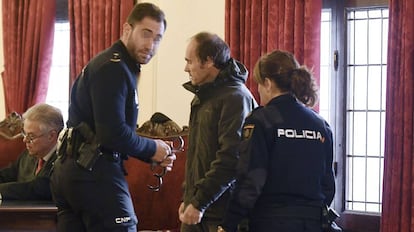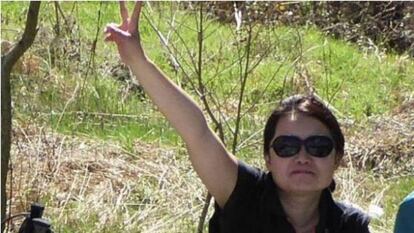Only suspect in murder of US tourist Denise Pikka Thiem found guilty
The woman was killed two years ago to the day while walking on the famous Santiago Way pilgrimage route
April 5 is a key date in the history of the Thiem family. That day, in 2015, the American tourist Denise Pikka Thiem was murdered on the famous pilgrimage route the Santiago Way. And today, exactly two years later, the spotlight was on the eight men and women in León who, just after 1pm, read out their verdict as a jury on the guilt or otherwise of the only defendant in the murder trial, Miguel Ángel Muñoz.

The jury found the accused guilty of killing the pilgrim, a decision that brings to a close a trial that has lasted more than three weeks and during which more than 100 witnesses took the stand. All that is left now is that, in the next few days, the León provincial High Court passes sentence on the convicted man. The prosecutor has called for 25 years in prison, while the private prosecution wants 27.
The prosecutor has called for 25 years in prison, while the private prosecution wants 27
Prosecutors say Thiem was murdered the same day she went missing while walking alone along a stretch in León between Astorga and El Ganso. The 41-year-old victim is believed to have taken a detour and became lost on her way back to the main road because she followed a yellow arrow – used to indicate the official route – that took her down another path leading to Muñoz’s home. He is believed to have placed this phony marker himself to lure pilgrims. Other women have reported being harassed in the same area.
An autopsy report found that Pikka Thiem was beaten with a stick, then finished off with a knife wound to her throat. Her hands were later cut off and never been found. Her body was located in September 2015, after the search was renewed following public revelations that US Senator John McCain had offered Spain help from the FBI to solve the case – an offer Spain ultimately refused.
Two other women who also walked the pilgrimage trail had previously reported being assaulted along the same stretch of road by a man matching Muñoz’s description.

The media coverage of McCain’s offer led the Spanish police to launch a massive search operation that led to Muñoz’s arrest within days. After his arrest in September 2015, the prosecution was facilitated by Muñoz’s immediate confession of the crime.
Police witnesses during the trial said that Muñoz broke down in tears while under interrogation. “At one point, he crouched down and began to cry, whimpering, ‘What have I done?’” Another police officer revealed that during his interrogation Muñoz agreed to take them to the spot where he had buried Thiem, saying: “Calm down, calm down, I’ll take you there.”
The 41-year-old victim is believed to have taken a detour and became lost on her way back to the main road
“We wouldn’t have found the body if he had not told us where it was,” said the Astorga police chief who headed the investigation. “He even boasted that if it hadn’t been for him, we wouldn’t have found it,” said one expert witness.
Later, the suspect retracted his confession, with his lawyer claiming that Muñoz had been pressured by the police into confessing. Muñoz refused to testify during the trial, saying: “I’m not going to answer any questions, neither from the prosecution or from my lawyer.”
“Muñoz is going to lie to you, because he has lied in the past,” said the prosecutor at the beginning of the trial. “This is a case of murder because there was malice. Denise was a slight woman, 1.55 meters tall, a foreigner in an unfamiliar spot. And she suffered a savage surprise attack. The victim’s body was found thanks to the defendant’s indications.”
English version by Nick Lyne and Simon Hunter.
Tu suscripción se está usando en otro dispositivo
¿Quieres añadir otro usuario a tu suscripción?
Si continúas leyendo en este dispositivo, no se podrá leer en el otro.
FlechaTu suscripción se está usando en otro dispositivo y solo puedes acceder a EL PAÍS desde un dispositivo a la vez.
Si quieres compartir tu cuenta, cambia tu suscripción a la modalidad Premium, así podrás añadir otro usuario. Cada uno accederá con su propia cuenta de email, lo que os permitirá personalizar vuestra experiencia en EL PAÍS.
¿Tienes una suscripción de empresa? Accede aquí para contratar más cuentas.
En el caso de no saber quién está usando tu cuenta, te recomendamos cambiar tu contraseña aquí.
Si decides continuar compartiendo tu cuenta, este mensaje se mostrará en tu dispositivo y en el de la otra persona que está usando tu cuenta de forma indefinida, afectando a tu experiencia de lectura. Puedes consultar aquí los términos y condiciones de la suscripción digital.








































